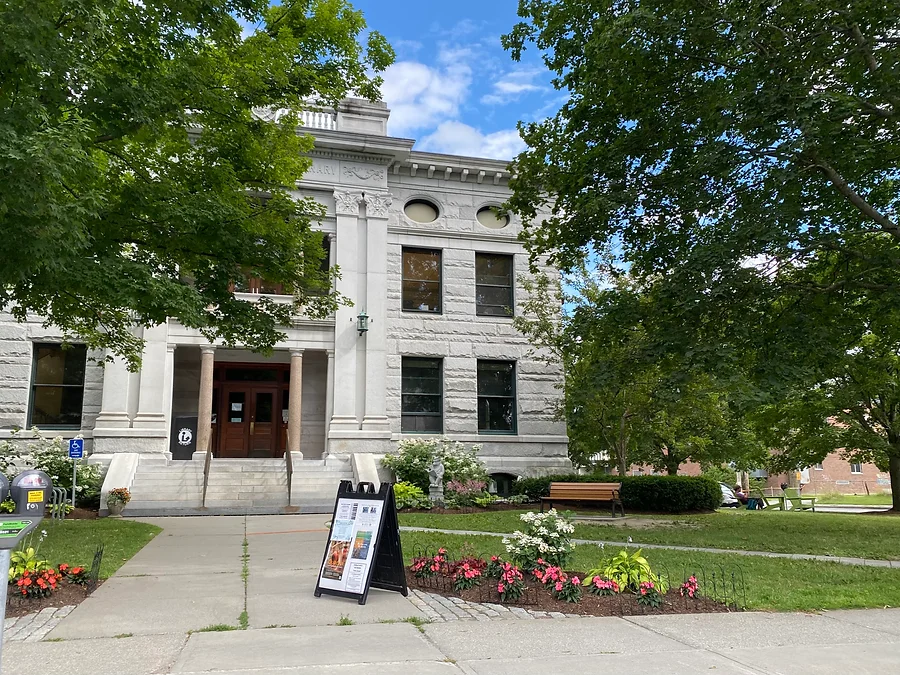Vermont librarians reflect on national rise in book bans, censorship
The outside of the Kellogg-Hubbard Library in Montpelier. Photo courtesy Kellogg-Hubbard Library
Maya Porter reported this story on assignment from the Barre-Montpelier Times Argus. The Community News Service is a program in which University of Vermont students work with professional editors to provide content for local news outlets at no cost.
The capital of an often self-styled progressive state might be one of the last places you’d expect drag performers in a community library to cause a stir, but to the surprise of Kellogg-Hubbard Library staff back in 2019, the announcement of their drag queen storytime was met with thousands of calls and emails in protest.
News of the event had reached internet circles far beyond the six-town region that the library serves. Library director Carolyn Picazio recalls receiving complaints from across the country. It became such a problem that library staff had to say they could only take commentary from local residents — after which Picazio remembers getting calls from people claiming to be locals who couldn’t even pronounce Montpelier.
Attempts to censor libraries have been on the rise across the country. According to the American Library Association, 2022 shattered the record of attempted book bans in libraries across the country. Vermont, however, has seen relatively little of this rise.
The association’s Office for Intellectual Freedom released data showing which states had the highest number of book challenges in 2022. Texas had the most with 93 challenges and 2,349 individual titles challenged. Vermont had two of the lowest figures: just three challenges and five titles challenged. The most challenged book in Vermont last year was Maia Kobabe’s “Gender Queer,” a graphic novel exploring gender identity, according to the data.
“I think Vermonters realize that we have a really diverse and interesting community, and we want that reflected in our collections too,” said Mary Danko, director of Fletcher Free Library in Burlington. “People really believe in the freedom to read. It’s one of our freedoms — nobody is forcing you to read any book that’s on our shelf, but you also shouldn’t have the right to take away any book that I might want to read, and I think that’s a value that Vermonters have. Vermonters value freedoms, and that includes the freedom to read.”
Children’s books, particularly those concerning identity, have been especially popular targets of censorship attempts nationwide. Though some Vermont librarians say they’ve received praise for the range of experiences and perspectives represented in their youth sections.
“Just talking with some of the parents I am friends with, they have been very complimentary, especially of our children's section, because of the diversity that we now have,” said librarian Adele West-Fisher of the St. Johnsbury Athenaeum. “Instead of getting complaints, we are getting compliments on our collection.”
Still, librarians in the state say they are conscious of the extent of censorship attempts and want to show people why reading shouldn’t be restricted. Norman Williams Library in Waterbury recently hosted Lt. Gov. David Zuckerman on his banned books tour, during which he read from books that have been banned across the U.S.
Library director Clare McFarland said the event was well attended.
“Going into it we were fearful that we might have someone show up that was opposed to us having such an event, but that turned out not to be the case at all because Vermont has been very lucky,” McFarland said. “It’s telling of the makeup of the entire community — that they’re open minded and willing to listen to other people’s ideas.”
Picazio, from the Montpelier library, said that to guard against book ban campaigns, “the best thing for a library to do is to have trained professionals running their library” and “really good policies on their books that they can follow impartially.”
The controversial drag queen event at Picazio’s library in 2019 led to further story times in the future. That first one, so hotly opposed, ended up being its most popular.
“We have since held drag queen storytime, which is always a popular program,” she said. “And it always goes over remarkably well. But when we offered it that year, we had like 135 people show up.”








